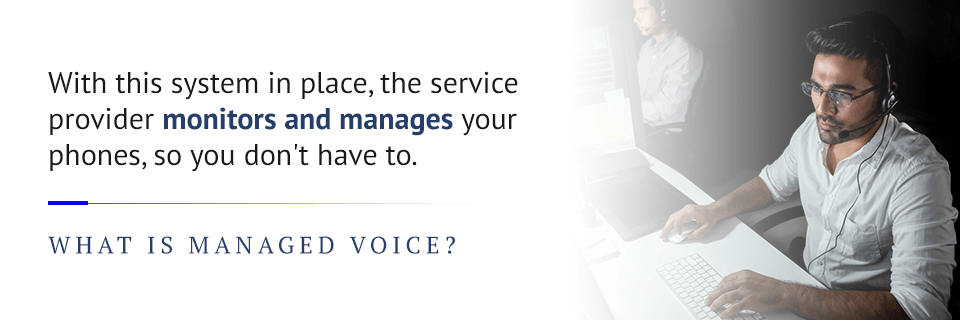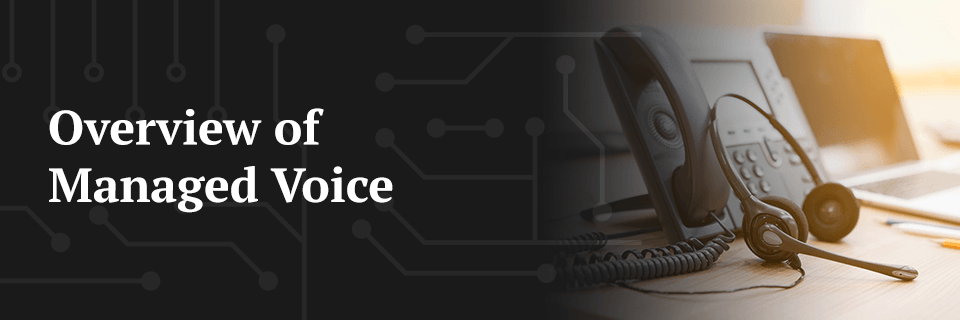Though phone systems can often be taken for granted by companies, they are one of the most important parts of any organization. A phone system can make or break relationships with clients, bring in new business and help your team provide top-quality customer service.
The advent of cloud-based technologies brought more options than ever before to phone systems. To give companies greater functionality and control over their business phones, innovators developed a revolutionary new way to interact with phone systems: managed voice solutions.
If you’re looking to stay on top of the latest technology, cut costs, deliver higher quality customer service and take responsibilities off your busy staff, you should consider managed voice solutions for your business.
What Is Managed Voice?
Managed voice services refer to a system that combines your internet connection, hardware and voice over internet protocol (VoIP) into one package that is managed by a service provider. With this system in place, the service provider monitors and manages your phones, so you don’t have to. For companies who don’t have the IT staff to handle the needs of a phone network, managed services are a perfect addition.

With a managed voice system, your telephone services will combine both voice and data into a fully integrated network. Whether your business has four lines or 50, a managed voice system is able to handle them with ease. You’ll only ever pay for what you need, and your costs will be adjusted based on the number of phones you employ.
Features of a Managed Voice System
A managed voice system offers all the features you’ve come to expect from traditional phone networks, such as voicemail, delayed call forwarding and call pickup, plus features that were once available only to the largest of companies. Additionally, its cloud-based nature means it’s a much smaller system than what companies expect from traditional phone systems.
Since there’s no longer a need for physical equipment with managed voice systems, they won’t take up space in your building. Along with its minimal presence, a managed voice system is often defined by its upgradable nature. For example, once one phone has been upgraded, the rest of the lines will automatically upgrade as well, since they are all connected by a cloud-based network.

Another key benefit of a managed voice system is that it doesn’t use a public network. Instead, it will only use a highly secure, private IP network. A managed voice system also works to ensure that users have the best quality of connection while speaking due to its prioritization of voice traffic.
These systems will come with a web portal that is accessible to both users and administrators. Due to the widespread adoption of web portals among those who use managed voice systems, users have a significant amount of customizability at their fingertips. For example, a web portal can be used to adjust a call pickup group or hunt group quickly.
In short, managed voice systems are cloud-based, comprehensive, technologically advanced, highly customizable, easy to upgrade, secure and, most importantly, at the top of the industry in voice quality.
Who Uses Managed Voice?
Managed voice is popular in a variety of industries. As long as a company needs to use phones to speak with clients, it’s likely a managed voice would be a great fit. Of course, companies that consistently use phones, such as those in customer service or sales, will get the most value out of the service. However, since costs typically scale for phone usage, even companies who rarely use their phones can receive affordable service and value.

There are very few disadvantages of managed voice, making it accessible for both small or large companies. For example, a larger company may want to implement a managed voice system because they want to free up the time of the IT staff for other tasks, while a smaller company may simply not have the resources to employ an IT staff at all. In either case, a managed voice system will take on the responsibility of managing and monitoring a company’s voice system.
Large or small, no matter the industry, companies all around the world trust managed voice to keep their phone systems running smoothly.
How Does Managed Voice Work?
Managed voice is a straight forward service that provides value to countless businesses across the world. When you hire a managed voice services company, they will immediately go to work setting up a system tailored for the needs of your company.
To begin, the company will deploy and implement a VoIP system at your business locations. They will make sure the system can meet all your phone requirements and ensure it’s up and running in time for your company to meet any deadlines. After the VoIP phone service is installed properly, the managed voice services company will monitor and manage the VoIP service to make sure its performance stays on the highest level.

A quality managed voice company ensures your company’s phone system is monitored 24/7. This around the clock monitoring means you can always feel confident you’ll be able to communicate with your clients and others without any technical difficulties slowing you down or disrupting you. Staff members from a managed voice company will look to identify and fix potential problems that could harm your company.
Powered by VoIP
To get an in-depth understanding of managed voice, you need to know how VoIP works, as it’s the engine that drives the whole system. A VoIP system is used by companies to give them the ability to make and receive phone calls. At its base level, its function is the same as a public branch exchange (PBX) system. However, a VoIP uses the internet to power the phone network, allowing users to make and receive calls.
In the past, companies had to rely on standard telephone lines to receive and make calls. These PBX-based systems typically had a manual control board, several lines that connected the phones to a public system and a computer server, which caused them to be very complicated. In contrast, a VoIP only requires an IP phone or computer and an internet connection.
One of the primary features of VoIP systems is their ability to be easily configured by users. Compared to PBX systems, VoIP-powered managed services are much more easily programmed and reprogrammed. Since the system can be managed from a computer and is designed for user accessibility, even those without expert knowledge can make changes to the system.

Whether your business only requires a small program like Skype to run your voice-based needs or a complex, large phone system, a VoIP can be adjusted by users with an accessible user-interface that you only need an internet connection to access.
For example, a company could program the user-interface to make incoming calls transfer to a single number or multiple numbers based on a variety of specific conditions. Some of the most common conditions usually incorporate the day of the week, the incoming phone number or the time of the day. Another popular feature of user-interfaces is their ability to transcribe voicemails to text. Whatever your needs, it’s likely the user-interface can be customized to accommodate them.
Equipment for a VoIP typically has a variety of options, while PBX can only one type of equipment. Traditional PBX systems will consistently use cord or cordless phones, along with hands-free applications, such as headsets. In contrast, the VoIP systems will have many more options.
For example, companies that want to have a classic phone experience will only need a wireless or IP phone that can connect to the internet. For more in-depth services, a VoIP can utilize a softphone client. This client allows users to make or receive calls from a mobile device or computer. Whatever your needs, it’s much more likely that VoIP has the equipment to make it happen.
What Are the Benefits of Managed Voice?
If you want to understand the pros and cons of managed voice, you’ll need to learn all the ways it benefits your business. Any company looking to optimize their business will appreciate the ways a managed voice system can cut costs and still deliver high-quality service.

To determine which type of phone system is right for your business, you should consider the benefits of managed voice, such as:
Cost-Effective Systems
If you’ve ever used a PBX system, you know how expensive it is to operate the hardware and maintain it. Not only can repairing or replacing parts come with unexpected costs, but it can also add to the amount of staff you have to employ to keep watch on and manage the systems. Whenever there is staff turnover at a PBX system, you’ll have to pay to train new employees to manage all of the equipment and processes.
To reduce the cost issues related to PBX systems, managed voice systems significantly lessen the amount of equipment needed and cut costs. Since managed voiced systems are cloud-based, companies will not have to worry about maintaining or managing equipment at their facilities.
The lack of equipment to maintain reduces your costs significantly both in the short term and long term. When you first implement a phone system, there will be little to no capital costs because you won’t have to purchase any new equipment. In the long term, you won’t have to spend money on housing the equipment, buying replacement parts or allocating manpower to keep it running smoothly.
Additionally, companies who use managed voice services will be able to outsource any hiccups in the system to the team managing it for them. Instead of having to pay for staff members to handle any problems or spend money on training new staff members on the ins and outs of a system, you’ll have an external team who will handle all of that for you, potentially saving you a great deal of money.
With the money you save, you can invest in new ventures or improve the services or products you currently provide. Additionally, the money can go back into upgrading your managed voice system whenever it needs to be updated.
Scalable Phone Systems
Along with saving money, your phone systems will be easily scalable with the growth of your company. In a PBX system, scaling your phone service would be an in-depth process. You’d have to put in new phone lines, bring in new equipment and designate time and labor to install the new phone system. All these considerations often take focus away from an exciting period of growth and distract from the ways you could be optimizing that growth.
A VoIP-based phone system is a breath of fresh air to any growing company. With a managed service, a growing company will be able to scale their phone system instantaneously. Whether you want to increase the number of lines your company uses or utilize more features, a managed service company can take care of it in a moment’s notice.
In the majority of plans on the market today, you’ll be able to adjust your phone system immediately to ensure it meets the ever-evolving needs of your business. You won’t have to worry about taking the time to schedule installations or devote your staff’s precious time to making the upgrade. Since a VoIP lives in the cloud, the changes will be made remotely without the challenge that installation typically brings.
Better Customer Service
With a typical PBX system, any damage or internal failures can knock out your company’s ability to communicate with customers via office phones. If a customer or client needs to reach your company to discuss a problem they are having, but can’t get through because the phone lines are down, they may form a negative impression of your company.
Not being there to assist your clientele can cause long-term damage to your company’s reputation and make clients believe your company doesn’t value them. Even having some of your phone lines go down can be a problem, as clients may end up speaking to staff who aren’t as well trained or equipped to handle their needs.
Managed voice companies take pride in the way they ensure your clients and customers have a way to reach the most qualified staff members at all times. Managed voice companies will watch your system and notify you if they detect any problems. Once they catch any failures, they’ll quickly control them and ensure your company has continuous service, unaffected by the current problem with the phone system.
For example, if a problem occurs and a couple of your phone lines go down, a VoIP lets the managed voice company instantly reroute any calls to the most qualified staff members while they simultaneously work to fix whatever the issue is. As a result, your company will maintain a high level of customer service, even when there are errors in the phone system.
Free Up IT Staff’s Time
One of the major advantages of managed voice for a busy company is the free time it generates for IT staff to work on other projects. Often, IT staff will manage all of the different technological systems for your business. By implementing a managed voice system, you’ll reduce the burdens on your IT staff, as they’ll no longer have to deal with this part of your business.
A managed voice provider will give your company 24/7 support, constantly monitoring how well the system is functioning and fixing any problems that come up. Additionally, the provider will consistently upgrade the system, making scaling easy. Without a managed voice provider, IT staff would have to take the time to do all of these functions, distracting them from their other responsibilities. As a result, it would take longer for them to complete all of their duties, slowing the organization down.

Without having to worry about the responsibilities of keeping a phone system running correctly, the IT staff will have time for other tasks. Whenever problems come up that need the staff’s full attention, a managed voice system will make sure the company’s phone system won’t be a distraction. Because the IT staff has one less responsibility, they can be more efficient and expand into other areas.
Easy Upgrading
Since managed voice systems are based in the cloud, your phone systems will be automatically upgraded without having to shut the entire system down. A quality managed voice service provider will be devoted to improving a company’s phone system. They will devote their time to staying current with industry trends and the newest advancements so they can apply them to your business.
With an external team devoted to one crucial aspect of your business, any of the upgrades that come available will be immediately applied to your business. This means your phone systems will always be on the cutting-edge, allowing you to stay ahead of the competition. Even better, these upgrades will not slow down your company’s day-to-day operations during the installation process or require you to devote staff to complete the upgrade.
Is Managed Voice the Right Choice for Me?
If the benefits listed above sound appealing to you, it’s likely a managed voice solution is right for you and your business. Companies who could benefit from lowering their costs, receiving a higher quality service and scaling up without any issues to their phone system would appreciate the perks managed voice solutions have to offer.

How Much Does Managed Voice Cost?
If you’re trying to determine if a managed voice system is right for you, you’ll need to consider the cost. The cost of a managed voice system is going to be scaled to the needs of your company, meaning you’ll never pay for services you don’t use or need. The best companies will make sure your costs come in single monthly payments that are predictable and low.
Work with an Expert at Morefield Communications
Should you choose a managed voice system for your business? At Morefield Communications, we think you should.
Since we’ve worked with a variety of companies, we know just how valuable a managed voice system can be for a business. The reduced costs, better technology and remote service our managed voice solutions provide are a win-win for our clients and us. With an improved, remotely managed voice network, companies love how they can focus more on new business ventures and the growth of their company rather than the state of their phone system.
By partnering with Morefield Communications, you’ll receive a variety of invaluable services. Some of the main services include priority response, security management and monitoring, remote and onsite maintenance and software upgrades, user training and unlimited tech support. To harness the advantages of a managed voice system, speak with an expert today to see how managed voice solutions can benefit your company.

